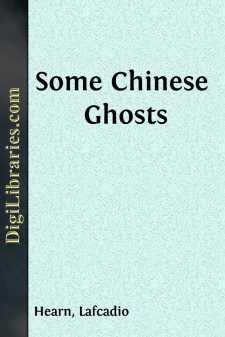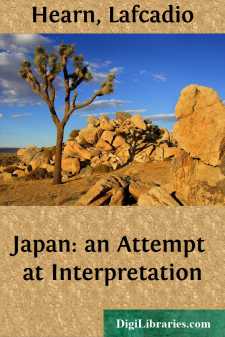Categories
- Antiques & Collectibles 13
- Architecture 36
- Art 48
- Bibles 22
- Biography & Autobiography 813
- Body, Mind & Spirit 142
- Business & Economics 28
- Children's Books 17
- Children's Fiction 14
- Computers 4
- Cooking 94
- Crafts & Hobbies 4
- Drama 346
- Education 46
- Family & Relationships 57
- Fiction 11829
- Games 19
- Gardening 17
- Health & Fitness 34
- History 1377
- House & Home 1
- Humor 147
- Juvenile Fiction 1873
- Juvenile Nonfiction 202
- Language Arts & Disciplines 88
- Law 16
- Literary Collections 686
- Literary Criticism 179
- Mathematics 13
- Medical 41
- Music 40
- Nature 179
- Non-Classifiable 1768
- Performing Arts 7
- Periodicals 1453
- Philosophy 64
- Photography 2
- Poetry 896
- Political Science 203
- Psychology 42
- Reference 154
- Religion 513
- Science 126
- Self-Help 84
- Social Science 81
- Sports & Recreation 34
- Study Aids 3
- Technology & Engineering 59
- Transportation 23
- Travel 463
- True Crime 29
Lafcadio Hearn
Lafcadio Hearn, born in 1850 in Greece, was a writer known for his works on Japanese culture and folklore. He moved to Japan in 1890, where he immersed himself in the culture, eventually becoming a naturalized citizen and adopting the name Koizumi Yakumo. Hearn's writings, such as "Kwaidan: Stories and Studies of Strange Things," played a significant role in introducing Japanese myths and traditions to Western audiences.
Author's Books:
Sort by:
by:
Lafcadio Hearn
THERE was a young Samurai of KyÃ
Âto who had been reduced to poverty by the ruin of his lord, and found himself obliged to leave his home, and to take service with the Governor of a distant province. Before quitting the capital, this Samurai divorced his wife,—a good and beautiful woman,—under the belief that he could better obtain promotion by another alliance. He then married the daughter of...
more...
by:
Lafcadio Hearn
The Legend of L'Ile Derniere Travelling south from New Orleans to the Islands, you pass through a strange land into a strange sea, by various winding waterways. You can journey to the Gulf by lugger if you please; but the trip may be made much more rapidly and agreeably on some one of those light, narrow steamers, built especially for bayou-travel, which usually receive passengers at a point not...
more...
by:
Lafcadio Hearn
Introduction These chapters, for the most part, are reprinted from Lafcadio Hearn’s “Interpretations of Literature,” 1915, from his “Life and Literature,” 1916, and from his “Appreciations of Poetry,” 1917. Three chapters appear here for the first time. They are all taken from the student notes of Hearn’s lectures at the University of Tokyo, 1896-1902, sufficiently described in the...
more...
by:
Lafcadio Hearn
The Soul of the Great Bell She hath spoken, and her words still resound in his ears. Hao-Khieou-Tchouan: c. ix. THE SOUL OF THE GREAT BELL The water-clock marks the hour in the Ta-chung sz',—in the Tower of the Great Bell: now the mallet is lifted to smite the lips of the metal monster,—the vast lips inscribed with Buddhist texts from the sacred Fa-hwa-King, from the chapters of the holy...
more...
by:
Lafcadio Hearn
KWAIDAN THE STORY OF MIMI-NASHI-HOICHI More than seven hundred years ago, at Dan-no-ura, in the Straits of Shimonoseki, was fought the last battle of the long contest between the Heike, or Taira clan, and the Genji, or Minamoto clan. There the Heike perished utterly, with their women and children, and their infant emperor likewise—now remembered as Antoku Tenno. And that sea and shore have been...
more...
by:
Lafcadio Hearn
I. … A long, narrow, graceful steel steamer, with two masts and an orange-yellow chimney,—taking on cargo at Pier 49 East River. Through her yawning hatchways a mountainous piling up of barrels is visible below;—there is much rumbling and rattling of steam- winches, creaking of derrick-booms, groaning of pulleys as the freight is being lowered in. A breezeless July morning, and a dead...
more...
by:
Lafcadio Hearn
AT A RAILWAY STATION Seventh day of the sixth Month;— twenty-sixth of Meiji. Yesterday a telegram from Fukuoka announced that a desperate criminal captured there would be brought for trial to Kumamoto to-day, on the train due at noon. A Kumamoto policeman had gone to Fukuoka to take the prisoner in charge. Four years ago a strong thief entered some house by night in the Street of the Wrestlers,...
more...
by:
Lafcadio Hearn
And it was at the hour of sunset that they came to the foot of the mountain. There was in that place no sign of life,—neither token of water, nor trace of plant, nor shadow of flying bird,— nothing but desolation rising to desolation. And the summit was lost in heaven. Then the Bodhisattva said to his young companion:—"What you have asked to see will be shown to you. But the place of the...
more...
by:
Lafcadio Hearn
A thousand books have been written about Japan; but among these,—setting aside artistic publications and works of a purely special character,—the really precious volumes will be found to number scarcely a score. This fact is due to the immense difficulty of perceiving and comprehending what underlies the surface of Japanese life. No work fully interpreting that life,—no work picturing Japan...
more...
by:
Lafcadio Hearn
INTRODUCTION Lafcadio Hearn, known to Nippon as Yakumo Koizumi, was born in Leucadia in the Ionian Islands, June 27, 1850. His father was an Irish surgeon in the British Army; his mother was a Greek. Both parents died while Hearn was still a child, and he was adopted by a great-aunt, and educated for the priesthood. To this training he owed his Latin scholarship and, doubtless, something of the...
more...











